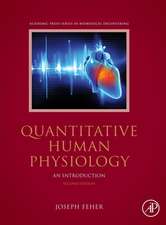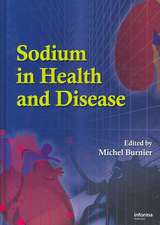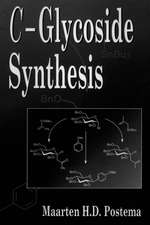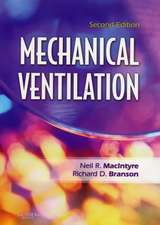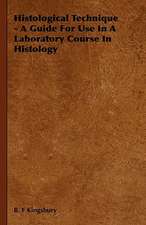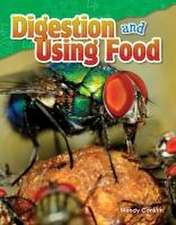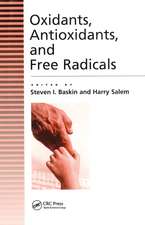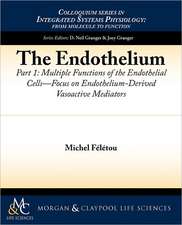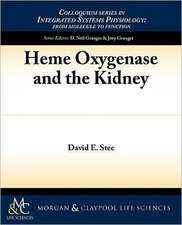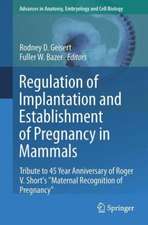Toxicology of Nanoparticles: Insights from Drosophila
Editat de Namita Agrawal, Prasanna Shahen Limba Engleză Paperback – 25 aug 2021
The book begins with a chapter on synthesis and characterization of nanoparticles used for various biological, medical and commercial purposes. The rest of the chapters deal with the impact of nanoparticles on different biological aspects like behavior, physiology and metabolic homoeostasis using Drosophila as a model organism. Lastly, the book summarizes how proper characterization and evaluation of safe dosage of nanoparticles can be a boon if incorporated in consumer goods and for biomedical applications. Overall, the book pursues an interdisciplinary approach by connecting nanotechnology and biology from various angles using Drosophila as a model system, so as to develop more efficient, safe and effective use of nanoparticles for human beings.
| Toate formatele și edițiile | Preț | Express |
|---|---|---|
| Paperback (1) | 706.97 lei 6-8 săpt. | |
| Springer Nature Singapore – 25 aug 2021 | 706.97 lei 6-8 săpt. | |
| Hardback (1) | 713.91 lei 6-8 săpt. | |
| Springer Nature Singapore – 25 aug 2020 | 713.91 lei 6-8 săpt. |
Preț: 706.97 lei
Preț vechi: 744.18 lei
-5% Nou
Puncte Express: 1060
Preț estimativ în valută:
135.28€ • 141.62$ • 111.93£
135.28€ • 141.62$ • 111.93£
Carte tipărită la comandă
Livrare economică 05-19 aprilie
Preluare comenzi: 021 569.72.76
Specificații
ISBN-13: 9789811555244
ISBN-10: 9811555249
Ilustrații: XII, 122 p. 34 illus., 30 illus. in color.
Dimensiuni: 155 x 235 mm
Greutate: 0.2 kg
Ediția:1st ed. 2020
Editura: Springer Nature Singapore
Colecția Springer
Locul publicării:Singapore, Singapore
ISBN-10: 9811555249
Ilustrații: XII, 122 p. 34 illus., 30 illus. in color.
Dimensiuni: 155 x 235 mm
Greutate: 0.2 kg
Ediția:1st ed. 2020
Editura: Springer Nature Singapore
Colecția Springer
Locul publicării:Singapore, Singapore
Cuprins
Chapter 1. Synthesis and characterization of nanoparticles used in consumer products.- Chapter 2. Model organisms for in vivo assessment of nanoparticles.- Chapter 3. Impact of nanoparticles on behavior and physiology of Drosophila melanogaster.- Chapter 4. Dose-dependent influence of nanoparticles on fertility and survival.- Chapter 5. Effect of nanoparticles on maintenance of metabolic homeostasis.- Chapter 6. Nanoparticles: an activator of oxidative stress.- Chapter 7. Safe dose of nanoparticles: A boon for consumer goods and biomedical application.
Notă biografică
Dr. Namita Agrawal is a Professor at the Department of Zoology, University of Delhi, India. Prior to joining the University of Delhi, she worked as a post-doctoral fellow, followed by research scientist and research specialist positions at the Department of Developmental and Cell Biology, University of California, Irvine, USA. She also served at the University of California, Irvine as a visiting scientist (2009-2012).
She has 12 years of experience in teaching Genetics, Cytogenetics and Developmental Biology to post-graduate students at the University of Delhi. Her research is focused on various diseases like cancer, neurodegenerative diseases in consort with nanotoxicity using Drosophila as a model organism. She has published numerous research articles in peer-reviewed journals like Science, PNAS, Journal of Cell Biology, Development, Developmental Biology, Nature Scientific Reports, and PLOS One, etc. She is also a member of various internationalsocieties.
Dr. Prasanna Shah worked as a post-doctoral fellow in USA with Indiana University Purdue University, University of Texas at Dallas and West Virginia University (2000-2012). Prior to which she was a STA fellow in Japan (1998-2000). She is a recipient of the Indian Science Congress Young Scientists Award (1995) and MPCST Young Scientists Award (1991). Her research interest comprises the study of nanoparticles for biomedical applications. She has extensive experience in the design, fabrication, and installation of inert-gas condensation chambers, which are used for nanoparticle synthesis. She has published many research papers in various peer-reviewed journals. She was Head of the Physics Department at Acropolis Institute of Technology and Research, Indore, India.
She has 12 years of experience in teaching Genetics, Cytogenetics and Developmental Biology to post-graduate students at the University of Delhi. Her research is focused on various diseases like cancer, neurodegenerative diseases in consort with nanotoxicity using Drosophila as a model organism. She has published numerous research articles in peer-reviewed journals like Science, PNAS, Journal of Cell Biology, Development, Developmental Biology, Nature Scientific Reports, and PLOS One, etc. She is also a member of various internationalsocieties.
Dr. Prasanna Shah worked as a post-doctoral fellow in USA with Indiana University Purdue University, University of Texas at Dallas and West Virginia University (2000-2012). Prior to which she was a STA fellow in Japan (1998-2000). She is a recipient of the Indian Science Congress Young Scientists Award (1995) and MPCST Young Scientists Award (1991). Her research interest comprises the study of nanoparticles for biomedical applications. She has extensive experience in the design, fabrication, and installation of inert-gas condensation chambers, which are used for nanoparticle synthesis. She has published many research papers in various peer-reviewed journals. She was Head of the Physics Department at Acropolis Institute of Technology and Research, Indore, India.
Textul de pe ultima copertă
This book offers an unparalleled source of information on in vivo assessment of nanoparticle toxicity by using Drosophila as a model organism. Nanoparticles have emerged as an useful tool for wide variety of biomedical, cosmetics, and industrial applications. However, our understanding of nanomaterial-mediated toxicity under in vivo condition remains limited.
The book begins with a chapter on synthesis and characterization of nanoparticles used for various biological, medical and commercial purposes. The rest of the chapters deal with the impact of nanoparticles on different biological aspects like behavior, physiology and metabolic homoeostasis using Drosophila as a model organism. Lastly, the book summarizes how proper characterization and evaluation of safe dosage of nanoparticles can be a boon if incorporated in consumer goods and for biomedical applications.
Overall, the book pursues an interdisciplinary approach by connecting nanotechnology and biology from various angles using Drosophila as a model system, so as to develop more efficient, safe and effective use of nanoparticles for human beings.
Overall, the book pursues an interdisciplinary approach by connecting nanotechnology and biology from various angles using Drosophila as a model system, so as to develop more efficient, safe and effective use of nanoparticles for human beings.
Caracteristici
Assesses the in vivo toxicity of nanoparticles using Drosophila as a model organism Reviews the synthesis and characterization of different nanoparticles Analyzes the dose-dependent influence of nanoparticle on fertility and survival Illustrates biomarkers which are associated with inflammation and oxidative stress due to nanotoxicity

